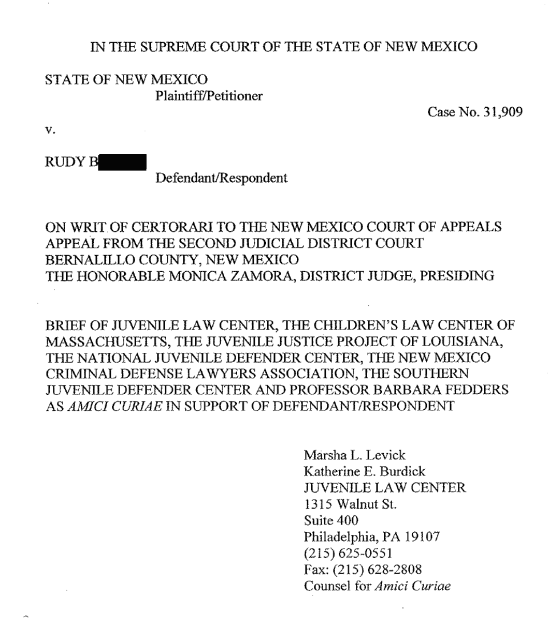
Summary of Argument
This case involves an issue of extraordinary importance to the lives of vulnerable youth – whether New Mexico’s amenability hearing structure unconstitutionally denies juveniles the right to have a jury decide whether they may receive an adult sentence.
New Mexico’s sentencing structure provides that a child can face an adult criminal sentence after appearing and participating in only juvenile proceedings. In order to impose an adult sentence, the judge must find that the child is “not amenable to treatment or rehabilitation as a child in available facilities” and that the child “is not eligible for commitment to an institution for children with developmental disabilities or mental disorders.” § 32A-2-20(B). The consequences to these children are profound. Rudy’s maximum sentence as a juvenile would have been confinement until age twenty-one – approximately three-and-a-half years. See § 32A-2-19(B)(1). Instead, he was subject to, and received, a twenty-five-year sentence.
The U.S. Supreme Court has long held that the judiciary must vigilantly guard against trial practices that reduce the jury’s significance, and that the jury right is of “surpassing importance.” Apprendi v. New Jersey, 530 U.S. 466, 476 (2000). See also Jones v. United States, 526 U.S. 227 (1999). In Apprendi v. New Jersey, the United States Supreme Court determined that a bright-line rule that a defendant is entitled to trial by jury beyond a reasonable doubt for any fact, other than the existence of a prior conviction, that increases a defendant’s sentence beyond the statutory maximum, would best protect this right. See 530 U.S. at 490.
In New Mexico v. Gonzales, 2001-NMCA-025, 130 N.M. 341, 24 P.3d 776, the New Mexico Court of Appeals held that section 32A-2-20 does not violate Apprendi because the amenability determination differs from findings related to elements of the crime. Id. ¶¶ 24, 26. Gonzales also set forth that Apprendi did not apply because all of the sentences were within the statutory range. Id. ¶ 31. As the Court of Appeals recognized in the proceedings below, subsequent United States Supreme Court cases rejected the reasoning supporting Gonzales. Rudy B., 2009-NMCA-104, ¶¶ 34-54.
Specifically, after the Court of Appeals decided Gonzales, the Supreme Court clarified that Apprendi applies to fact-finding in a variety of contexts, including sentencing factors like those at issue here. Ring v. Arizona, 536 U.S. 584 (2002); Blakely v. Washington, 542 U.S. 296 (2004); Cunningham v. California, 549 U.S. 270 (2007). The Court also specified that a statutory maximum is the maximum sentence a judge could impose based on the facts considered by the jury. Ring, 536 U.S. at 602. The other sentencing schemes to which the Court applied Apprendi, amenability hearings require judicial fact-finding as a prerequisite to increasing the defendant’s sentence above the statutory maximum.
The Court of Appeals thus properly overruled Gonzales and held that section 32A-2-20(B) and (C) defied Apprendi’s bright-line rule, and, therefore unconstitutionally eroded the Sixth Amendment right to trial by jury. Id. Amici respectfully request this Court to affirm that judgment.